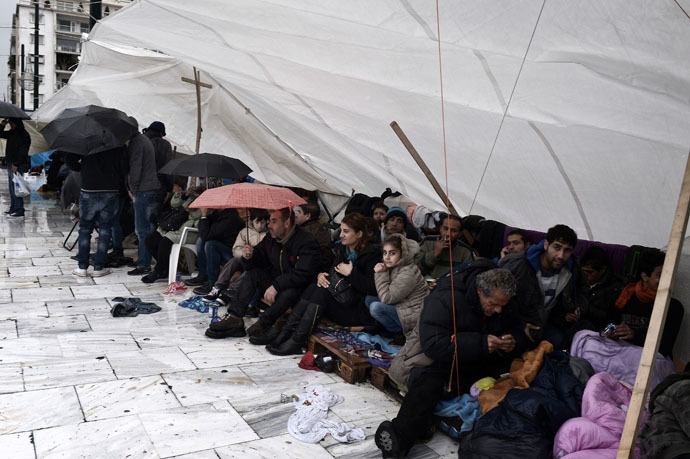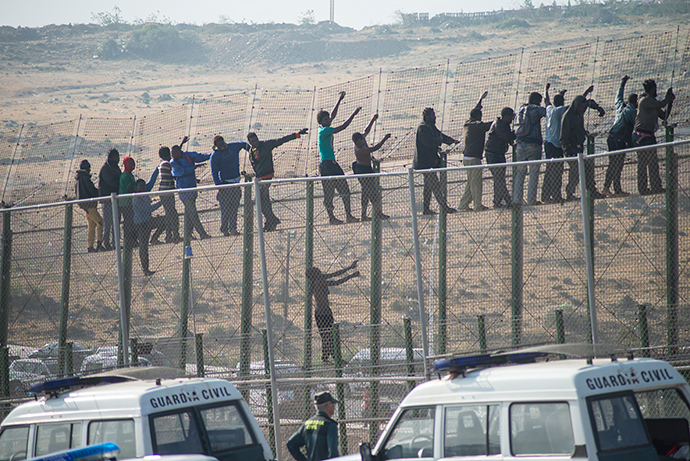UN urges EU to take refugees despite anti-migrant protests
Refugees arriving in Europe from war-torn Syria asking for asylum are putting an additional burden for the EU, whose economy is in crisis and where xenophobia is on the rise.
Over three million people, according to humanitarian organization Migrants' Rights Network, have left Syria due to the war, and some of them headed to the EU asking for asylum. They travel to Europe “to have better life, to have good life, to have peace life,” one refugee told RT in Greece, which has seen a significant influx in recent years.
“We don’t see limits and we don’t want to see people sleeping in the streets,” says Angelos Syrigos, Greek Interior Minister. Although Greece is ready to receive refugees it cannot accept them all.
“But at the same time, their numbers are so vast,” adds Syrigos.

In November up to 200 Syrians seeking asylum in the EU began a sit-in in Athens’ main square in a bid for asylum status, temporary working permits and medical care. The financially strapped Greek government says it doesn’t have the resources to deal with the growing refugee problem.
READ MORE: Syrian refugees launch hunger strike outside Greek parliament
The bulk of the refugees hope to leave Greece for Northern Europe. Based on EU immigration policy, the migrants cannot move to other EU countries unless on a tourist visa, and can only stay a maximum of 90 days in any six months.
UN and other humanitarian organizations, including Migrants' Rights Network, urge the EU to speed up the process of receiving the refugees. The MRN says the EU can and must receive at least 180,000 migrants. However some countries are not eager to accept them.
"We’re not ready to accept everyone, we shouldn’t accept everyone, we don’t need everyone,” says Kent Ekeroth from Sweden Democrats Party.
Another problem that the migrants face is growing level of racism and Islamophobia. In Germany, opponents of Islamization gathered a record 15,000 people to march against "asylum cheats" in the country.
The movement – "Patriotic Europeans Against the Islamisation of the Occident," or PEGIDA – is gathering momentum to protest plans to add 14 centers for roughly 2,000 refugees in the eastern city of Dresden.
Nationalist activists carried banners reading "Courage for the truth” and "Stop immigrants abusing our social welfare system," as well as "We miss our country.” They also chanted: "If you don't love Germany, leave it" and "We're the people.”
Similar protests are gaining momentum across Germany as asylum seekers surged to some 200,000 this year, due in part to an influx of Syrians.

READ MORE: Thousands in Dresden rally against Islamization, call for Western values
Often migrants seeking a new life in Europe try to enter EU countries illegally.
In October migrants clashed with the police in Calais as some 2,500 people tried to reach Great Britain which is seen by many as a safe haven, with a stable economy and strong tradition of tolerance toward refugees from war. The Mayor of Calais Natacha Bouchart said in September that the UK benefit system is a “magnet” for illegal immigrants, who see Britain as a “soft touch.”
Illegal African migrants from Morocco have also found a way to seek a new life in Europe by jumping over the fence built around the Spanish enclaves in North Africa.
READ MORE: Blade runners: 5-meter razor-wired wall planned to keep Moroccan migrants out of Spain
One of the biggest escapes in nearly a decade occurred in March, when 1,000 people jumped the existing triple-layer wire fence built by the Spanish, with about half of them successful. Another 500 people tried to leap to freedom in May, with about a quarter getting through into Spain.

Later Moroccan authorities revealed a plan to erect a five-meter high wall, topped with blades and barbed wire, on the border with the Spanish North African enclave of Melilla. The measure will target migrants trying to cross into Europe.
Over 3,400 migrants and refugees have drowned in the Mediterranean Sea this year trying to reach the European coast. Italy has managed to rescue more than 150,000 people this year – a large number of whom have congregated around the island of Lampedusa near Sicily. The total number of people who have attempted the illegal crossing to Europe over the Mediterranean Sea this year is over 207,000.
READ MORE: 3,400 dead at sea: UN slams Europe for snubbing safety over immigration barriers












